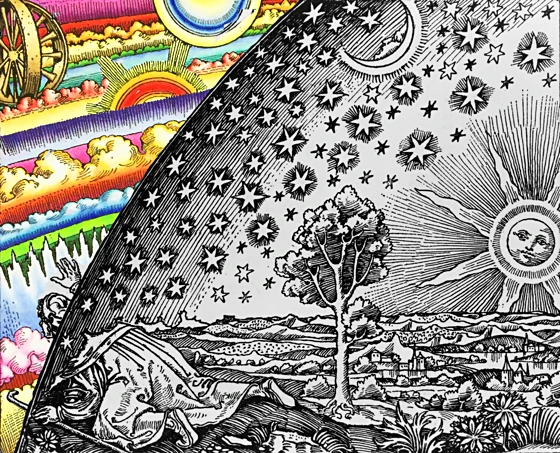
We want to deny nebulosity and fixate pattern. Denial fails when the nebulosity of some meaning in the actual world becomes too obvious. Then we may retreat to an imagined Fairy Neverland of pure pattern, uncontaminated by messy nebulosity.
Eternalism exchanges realities, declaring that Neverland is the really real world, and the apparent word is illusory. Nihilism rejects Neverland but fails to undo the other half of the swap, so it too denies everyday meaningfulness.
Sometimes, “transcendent” gets used loosely just to mean “extra special,” as in “a transcendent athletic performance.” In this sense, “transcendent meaning” is just “special fancy meaning.” Some authorities explicitly equate it with absolute, infinite, and eternal meaning.
Typically, though, the sense is that real meaning is elsewhere—in Neverland. “Transcendent” often contrasts with “mundane,” literally meaning “in the world.” Here in the world, the only meaning is mucky mundane meaning, which is no damn good.1 Transcendent meaning is external, independent, set apart, and therefore uncontaminated by nebulosity.
Our limited perspective, trapped in the murk of the material world, cannot discern meaning accurately. On that, eternalism and nihilism agree. To see what is “really” meaningful, you’d have to stand outside the universe, like God. Nihilism says that that is impossible and meaningless. There is nothing outside materiality: no meaning anywhere.
Eternalism promises meaning in Neverland. But, wait, if real meaning is entirely elsewhere, what good is it? One theory is that some mundane meanings are OK after all, but only because they are shadows of the transcendent meanings that exist in another dimension. Alternatively, we can’t access transcendent meanings here, but we can sometimes get a glimpse into the Higher Reality. Or transcendent meanings shine into our fallen world, like shafts of sunlight through chinks around the closed door of a dark hut.
For traditional rationalism, Neverland is the Platonic Realm of Pure Forms. For modern rationalism, it is the Platonic Neverland’s descendent, the abstract realm of formal models.2 For the Biblical religions, Neverland is Heaven, where God lives. Heaven has seemed decreasingly plausible for centuries, and it’s an easy step to drop it.
Then you may fall into nihilism, without noticing eternalism is wrong about mundane meanings. Maybe, on reflection, those can meet your requirements? Even if not all your hopes.
“Natural Law” provides a more believable sense of “transcendent meaning.” There are factual Laws of Physics; maybe there are Laws of Meaning, such as moral laws, inherent in physical reality. They may transcend social conventions and subjective personal beliefs. Maybe they can be derived from an understanding of evolution by natural selection. Some intelligent non-human animal species seem to have a basic sense of ethics, purpose, value, and self. Evolved meaning is probably a significant part—but only a part—of a full and accurate understanding of meaning overall. We’ll explore non-human morality in the chapter on ethics for that reason.
Like Christian Creationists, nihilists reject evolved meaning, on the basis that evolution is a random, meaningless process, and nothing meaningful can come from something meaningless. We’ll return to that mistaken idea in “No evolved meaning.”
“No objective meaning” is core to post-rational nihilism. Objective meaning would transcend the individual. Nihilism is right that objective meaning, in the sense of residing inherently in objects, doesn’t exist—because meaning is interactive. However, there is another sense of “objective”: meanings that reasonable observers generally agree on. Those certainly do exist. And as interaction, all meaning “transcends” the individual, because interactive is not subjective!
“Transcendent” can simply mean “incomprehensible”; some dictionaries give this as a major sense. “Incomprehensible” doesn’t necessarily imply non-existent, but it should make you suspicious and want to ask hard questions. “Transcendent meaning” is often said to be invisible, ineffable, and accessible only through special, “mystical” means, maybe only by special people. These are convenient properties when constructing propaganda for an eternalist system. It’s reasonable to suppose such “meaning” is usually imaginary.
The complete stance doesn’t categorize meanings as transcendent or not. Some meanings are much more important than others, but they are not set apart as special, or entirely different in type. Most meanings are obvious, generally agreed on, and easy to understand.
That said, some meanings are “non-ordinary”: they may indeed be ineffable, difficult to understand, resistant to public inspection, and accessible only through atypical means. These are worth exploring, carefully. One must steer between the eternalist Scylla of making them mean more than they do and the nihilist Charybdis of denying that they are more than delusions. The complete stance advises allowing meanings, more than searching for or creating them.
- 1.“Transcendent” also sometimes contrasts with “immanent,” which also means “in the world,” but differently. “Immanent” is in the world but good, whereas “mundane” is in the world and bad. Some religions recognize the logical and emotional problems that result from declaring that all apparent meanings are bad, and only transcendent meaning counts. They try to resolve the difficulty by declaring the sacred both transcendent and immanent. This move is “controversial” and generates extensive obscure but heated theoretical debates, which suggests it doesn’t work very well.
- 2.Most rationalists are deeply committed to both physicalism—the doctrine that only physical things exist—and the existence of a non-physical realm of formal objects. They try not to notice the contradiction. Part One of In the Cells of the Eggplant discusses this at length. See particularly the chapters “Reference: rationalism’s reality problem” and “What can you believe?”.
